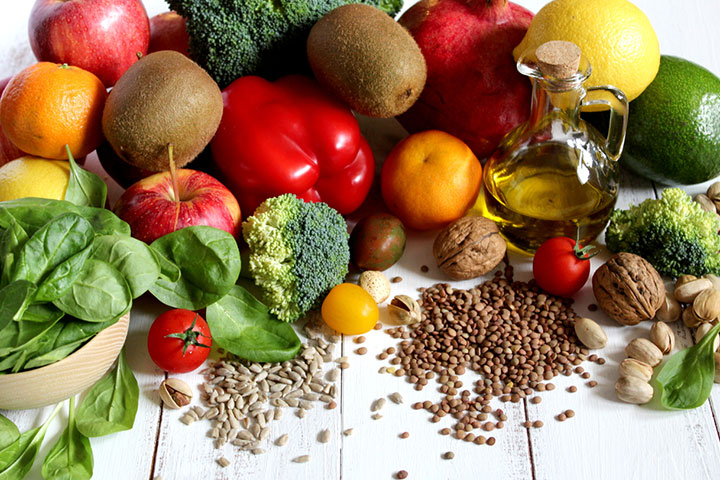Many obstetricians advise that mothers eat foods high in vitamin C while breastfeeding. Vitamin C, also known as ascorbic acid, is a water-soluble vitamin mostly found in fruits and vegetables. It is a crucial antioxidant and a typical ingredient in human milk. It also protects and maintains the health of the body’s cells, assists in wound healing, and improves iron absorption.
Since our bodies cannot produce this vitamin, it should be supplemented through our diet. The recommended daily intake of vitamin C for a lactating woman is 120mg, and it is important to ensure that her dietary intake includes this amount. A mother who is healthy and eats a balanced diet would have sufficient amounts of vitamin C in her breast milk (1)
Read this post to learn more about vitamin C and breastfeeding, including the effects of vitamin C on breastmilk and how you can maintain the vitamin C level in your breastmilk.
Benefits Of Vitamin C During Breastfeeding
Vitamin C is an essential micronutrientiXVitamins and minerals, required in small amounts, that are not produced by the body and need to be taken from different sources that plays a vital role in providing nutrition and supporting the proper functioning of the body. Here are some possible benefits of taking vitamin C during breastfeeding.
- Vitamin C is a cofactor for many enzymes involved in the biosynthesis of collagen, carnitineiXA chemical cofactor produced in the kidneys and liver that helps metabolize fat to produce energy, and neurotransmittersiXChemical messengers in the brain that send signals throughout the body to carry out different functions. Hence, it aids in the growth of bones and teeth (2).
- It stimulates collagen production, the main protein found in the blood vessels, cartilage, tendons, ligaments. etc. (3).
- Ascorbic acid helps the body absorb iron from the gastrointestinal tract.
- As it has antioxidant properties, it reduces the number of free radicals in the body, thus reducing cancer risk.
- Vitamin C also helps in faster wound healing and quicker restoration of the tissues.
- It gives your immune system a boost and helps you and your baby fight off infections (4).
- Mastitis is a condition also known as inflammation of the breast which affects 3-20% of breastfeeding mothers, most commonly during the first 6 weeks postpartum (although it can occur at any time during lactation). Studies have found that the incidence of mastitis was found to be higher in mothers who were deficient in vitamin C (5). Taking vitamin C supplements may help prevent mastitis.
- Studies have proven that a maternal diet rich in natural sources of vitamin C during breastfeeding could reduce the risk of atopic diseases such as eczemaiXNon-contagious skin condition resulting in inflamed, dry, and scratchy skin due to specific foods or medicines, asthma, and allergies in infants (6).
Dosage And Dietary Sources Of Vitamin C
If you are a nursing mother, you may need to check your vitamin C levels and make sure they are at the recommended levels. For mothers 18 years or younger, the recommended amount is 115mg/day, and for mothers above 18 years, it is 120mg/day (2).
Fresh fruits and vegetables are the best sources of vitamin C. Some of the foods rich in vitamin C include citrus fruits, broccoli, cantaloupe, potato, bell pepper,tomato, kiwi, cauliflower,cabbage, strawberry, and Brussels sprouts (7).
Signs Of Vitamin C Deficiency
The following are the most common signs and symptoms of vitamin C deficiency (8).
- Scurvy
This is characterized by the loss of collageniXA structural protein of the body that helps build the connective tissue, skin, bones, and tendons and provides flexibility and weakening of connective tissues and could lead to
- Spots on the skin due to bleeding and bruising of blood vessels.
- Bleeding and swelling of the gums and potential loss of teeth.
- Hair loss.
- Delayed wound healing
- Fatigue and a general feeling of being unwell
- Anemia
Can You Take Vitamin Supplements While Breastfeeding?
The average milk vitamin C concentration is 50-90 mg/L in a well-nourished mother consuming adequate vitamin C in their diet. However, mothers who smoke have lower milk vitamin C levels (1). If you are breastfeeding and diagnosed with low vitamin C levels, consult your doctor for some supplements.
According to a study of mothers who were administered high doses of vitamin C between 250-1,000mg/L daily, the average milk concentration was 100-120mg/L after two days of supplementation. Even when one mother took doses as high as 4,000mg/L vitamin C per day, the breast milk concentration of vitamin C was well below the levels known to cause harm (9). Therefore it is best to consult your doctor for the recommended supplemental dosage.
Side Effects Of Excessive Vitamin C
Taking higher concentrations of vitamin C supplements than those recommended by your doctor may have the below side effects.
- Tissue damage
- Kidney stones
- Diarrhea
- Nausea
- Vomiting
- Heartburn (7)
Vitamin C while breastfeeding is recommended because it nourishes you and your baby. The vitamin can help provide stronger bones and teeth, faster wound healing, and prevent mastitis. A balanced diet will give you adequate vitamin C required for your body. However, if you notice swelling and bleeding of gums, hair loss, or delay in wound healing, it may be possible that you have a vitamin C deficiency. Seek your doctor’s advice on this matter. They may recommend specific diets or supplements to replenish your needs.
Key Pointers
- Consuming a vitamin-C rich diet is beneficial when breastfeeding.
- It helps you and your baby fight illnesses by boosting your immune system.
- Vitamin C deficiency can lead to fatigue, scurvy, and anemia.
Feeling tired and run down? Bad teeth? You may have a Vitamin C deficiency, or scurvy. Learn why these symptoms happen and who is most at risk.















